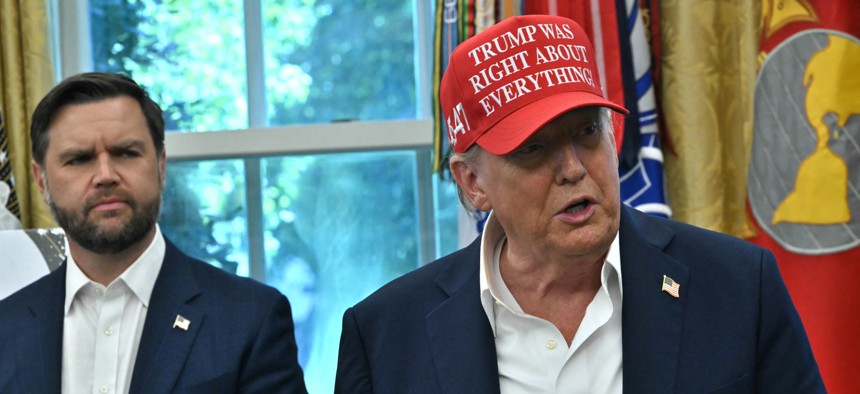
President Donald Trump, speaking from the Oval Office of the White House on Aug. 22, 2025, said federal law enforcement were "going to make our cities very, very safe." ANDREW CABALLERO-REYNOLDS / AFP / Getty Images
Federal law enforcement deployments are coming to other cities, Trump says
The president's authority to issue such deployments is unclear.
Federal law enforcement personnel will soon deploy to other cities around the country, President Trump said at the White House on Friday, even as he suggested he could keep officers and agents in Washington past their 30-day limit.
Trump suggested employees from the departments of Justice, Homeland Security and other agencies could go out to several cities to tackle crime, adding Chicago would come next after the nation’s capital. Federal personnel have deployed throughout Washington in recent weeks at Trump’s direction, where they have conducted activities ranging from enforcing traffic violations to making arrests related to alleged immigration violations.
“After we do this, we'll go to another location,” Trump said. “We'll make it safe, we're going to make our cities very, very safe. Chicago is a mess.”
Crime in Chicago, like Washington and most major cities in the United States, has trended down in recent years and has gone down this year in particular. The Justice Department reported in January that violent crime in Washington had hit a 30-year low.
The mechanism for deploying staff from agencies such as the FBI, Drug Enforcement Administration, Customs and Border Protection, Immigration and Customs Enforcement, U.S. Park Police and others that have patrolled Washington to other cities remains unclear. Their presence in the capital was aided by Trump’s decision to federalize control of the district’s police force, an option uniquely available due to the 1973 Home Rule Act not applicable to any other cities.
Trump said after Chicago he would consider deploying feds to New York. Leaders there and in Illinois have signaled they would not be amenable to such an arrangement.
Under the Home Rule Act, Trump can control Washington for 30 days, after which time Congress would need to authorize an extension. Trump suggested on Friday he could circumvent that limitation by declaring a national emergency, though he hoped to avoid doing so.
Around 500 federal officers and agents are currently patrolling in the capital, with support from a cadre of National Guard soldiers that is growing to 2,000 individuals in the coming days. Attorney General Pam Bondi said 719 arrests have been made in Washington since the federal deployments began, though she did not specify whether that was in addition to the normal arrests by the city’s own police force.
The president also suggested he was working with Republican leadership in Congress to approve an additional $2 billion in funding to “clean” Washington.
Share your news tips with us:
Eric Katz: ekatz@govexec.com, Signal: erickatz.28
NEXT STORY: Improved emergency communication in federal buildings focus of new bipartisan legislation







